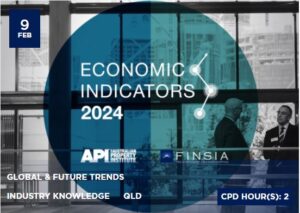Last week, I was fortunate to attend a luncheon, hosted by FINSIA and the Australian Property Institute, entitled Economic Indicators 2024. The main guest speaker was Paul Bloxham, the Chief Economist for HSBC. Meetings like this give you time to reflect on changing economic conditions, looking back over the past years and then trying to forecast what are the most likely scenarios going forward.

Paul Bloxham is an economist who writes extensively and is a much sort after guest speaker. I found Paul completely engaging and had the audience captivated by the content of the talk. If economic indicators are of interest to you, I would recommend you follow Paul on LinkedIn. His most recent post was Australian Economic Comment.
The good news seems to be that Inflation is starting to fall, and the economy is unlikely to have a recession.
For those who have a particular interest in real estate and rental incomes, Cr Fiona Cunningham, the second guest speaker, explained how the Brisbane City Council tries to manage local property taxes which in turn will affect rental incomes. Fiona is the Civic Cabinet Chair, Finance & City Governance. For me, the important takeaway was that policies implemented by local governments can influence the supply and demand of rental accommodation which will ultimately affect the costs of owning an investment property. According to Fiona, the other two parties seeking election in March have policies that will greatly increase the cost of rates.
Currently, all levels of government are trying to control the housing market. While ideas such as rent freezes may seem popular, this type of action is likely to have unintended consequences. The majority of residential property investors are average people, trying to secure a better financial future. Most will have mortgages in addition to the normal expenses such as government charges, insurance, and maintenance.
Over the last few years, I have been monitoring my real estate expenses. All properties are self-managed, so I don’t have real estate agent fees. Including a 10% allowance for repairs and maintenance, the cost is 52% of gross income. If a rental freeze for say 2 years were implemented, then the cost would be even greater. For many, this would drive some landlords out of the property market, most likely never to return. If you are a property owner, work out what percentage of your rental income is used to pay expenses.
One of the changes that have occurred in Queensland is that rents can only be increased once a year. For me, I have now changed the lease term to 12 months rather than 6 months. Longer-term fixed leases are likely to exclude many people. Follow the rental increase discussions in the news and ensure that your leases, give you as much protection as possible from unexpected changes to how you can charge rent.
During lunch, I spoke with one of the guests at my table and the discussion turned to her personal thoughts on real estate. She was in her early fifties and told me that she had bought her “forever home”. She said that she had found the cost of buying and selling together with the disruption of moving brought her to this decision. She had carefully selected a home that would meet her needs as she got older.
If you are a property investor, I believe that there is value in carefully selecting your properties so that you can keep them for a very long time. This will mean considering some of the following:
- Is the property likely to have a strong rental demand in future years.
- Will the property require major renovations in your lifetime.
- Will the property provide you with adequate income in retirement.
I have a saying about investment property:
If you never sell a property, you never pay Capital Gains Tax
When you own property for the long term, the Capital Gains Tax can be quite substantial. Imagine making a nominal profit of $5m over 30 years. You will pay tax on 50% of that gain and this will be added to your taxable income in that year. With a marginal tax rate of 30%, you would have to pay $750,000 Capital Gains Tax. This is $750,000 less you have to invest from the sale of the property. This is a very good reason to ensure that any investment property purchased will meet your long-term needs and you will not be forced to sell it.
Financial Mappers is software that allows you to plot the capital growth and capital gains tax of property investments for up to 50 years.
Glenis Phillips SF Fin – Designer of Financial Mappers and Advice Online
Disclaimer: Financial Mappers does not have an Australian Services License, does not offer financial planning advice, and does not recommend financial products.







